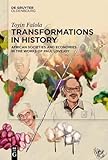Transformations in History : African Societies and Economies in The Works of Paul Lovejoy / Toyin Falola.
Material type: TextPublisher: Mnchen ; Wien : De Gruyter Oldenbourg, [2024]Copyright date: 2025Description: 1 online resource (XII, 287 p.)Content type:
TextPublisher: Mnchen ; Wien : De Gruyter Oldenbourg, [2024]Copyright date: 2025Description: 1 online resource (XII, 287 p.)Content type: - 9783111342078
- 9783111349251
- 9783111348964
- 330.96
- online - DeGruyter
- Issued also in print.
| Item type | Current library | Call number | URL | Status | Notes | Barcode | |
|---|---|---|---|---|---|---|---|
 eBook
eBook
|
Biblioteca "Angelicum" Pont. Univ. S.Tommaso d'Aquino Nuvola online | online - DeGruyter (Browse shelf(Opens below)) | Online access | Not for loan (Accesso limitato) | Accesso per gli utenti autorizzati / Access for authorized users | (dgr)9783111348964 |
Browsing Biblioteca "Angelicum" Pont. Univ. S.Tommaso d'Aquino shelves, Shelving location: Nuvola online Close shelf browser (Hides shelf browser)
Frontmatter -- Preface -- Contents -- Chapter 1 Introduction: Studies By Paul Lovejoy -- Chapter 2 The Making of Paul Lovejoy -- Chapter 3 The African Knowledge Economy -- Chapter 4 Local and Global Power: Internal Slavery, West Africa and The Europeans -- Chapter 5 Forces Behind Slavery: Geography and Trade -- Chapter 6 Brutal Exchanges: Debts and Humans -- Chapter 7 The Economic Dimensions of Slavery -- Chapter 8 Jihads and Slavery -- Chapter 9 The Igbo -- Chapter 10 Gender and Slavery -- Chapter 11 Identities in the New World -- Chapter 12 Colonialism and African Resistance -- Chapter 13 Memories and the Pains of the Present -- Chapter 14 Multiculturalism and Diversity in the Diaspora -- Conclusion -- Bibliography -- Index
restricted access online access with authorization star
http://purl.org/coar/access_right/c_16ec
The book uses the main body of Lovejoy’s work to speak to core African and economic history issues. It thoroughly examines Lovejoy's contributions to the study of Africa, particularly in exploring issues around production and exchanges at local, regional and international levels. The book offers readers a fresh perspective on the discourse of slavery and colonialism while simultaneously introducing them to the quality of work already accomplished by a stellar scholar. As the book argues, Lovejoy presents verifiable historical data that nudges us to reconsider our perception of Africa’s growth trajectory, especially before its encounter with the Americas. A chapter examines the various ways by which the people experienced slavery before it became proliferated during the time Europeans entered into the business. Another chapter addresses questions about the progressive efforts of slave traders to access the interior to drive more victims who would be shipped to the Atlantic for the business of servitude to advance the European economy. Alongside this exploration, a provides the background as to the contributions of Africans to ensure the continuity of this business. Lovejoy notes, for instance, that Muslims were found in every region in the Americas during slavery, which indicates that they were being taken there through transatlantic slavery. While Muslims were found in these areas, it was not true that they were there in large numbers. This is underscored by their resistance to all forms of forced extraction of the people from their homeland. In essence, they challenged the system in ways that redefined their participation in the exercise. The book analyzes how Muslims ensured that economic and political power were withdrawn from the hands of the victims and how they systematically created institutions that promoted that very inequity. Lovejoy’s extensive knowledge allows us to develop theories and establish applicable methodologies for understanding African reality since the precolonial era. He presents original perspectives about addressing issues of African-American engagements and the roles of critical voices in the diaspora. Consequently, the book is an invaluable educational resource, particularly for people who want to deepen their understanding of African social and economic history.
Issued also in print.
Mode of access: Internet via World Wide Web.
In English.
Description based on online resource; title from PDF title page (publisher's Web site, viewed 20. Nov 2024)









